浙江省建人高复2019届高三12月份月考试卷英语试卷(Word版,含答案)
2019-2020年高三上学期12月月考试题 英语 含答案
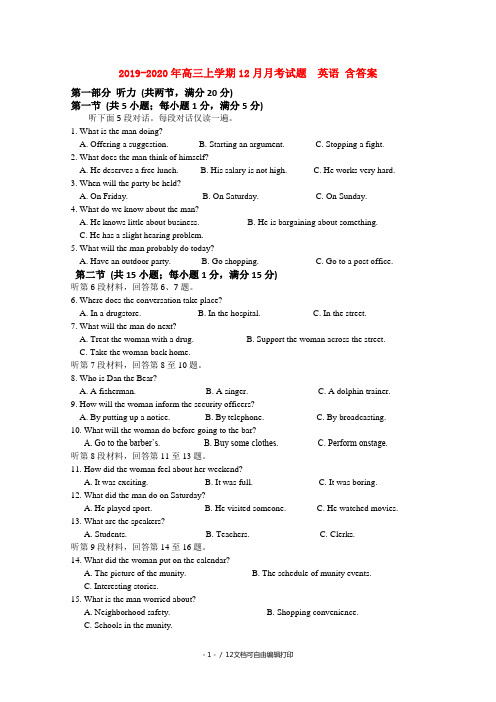
2019-2020年高三上学期12月月考试题英语含答案第一部分听力(共两节,满分20分)第一节(共5小题;每小题1分,满分5分)听下面5段对话。
每段对话仅读一遍。
1. What is the man doing?A. Offering a suggestion.B. Starting an argument.C. Stopping a fight.2. What does the man think of himself?A. He deserves a free lunch.B. His salary is not high.C. He works very hard.3. When will the party be held?A. On Friday.B. On Saturday.C. On Sunday.4. What do we know about the man?A. He knows little about business.B. He is bargaining about something.C. He has a slight hearing problem.5. What will the man probably do today?A. Have an outdoor party.B. Go shopping.C. Go to a post office. 第二节(共15小题;每小题1分,满分15分)听第6段材料,回答第6、7题。
6. Where does the conversation take place?A. In a drugstore.B. In the hospital.C. In the street.7. What will the man do next?A. Treat the woman with a drug.B. Support the woman across the street.C. Take the woman back home.听第7段材料,回答第8至10题。
2018-2019学年高三英语12月月考试题

浙江省建人高复2018-2019学年高三英语12月月考试题本试卷分第I卷(选择题)和第II卷(非选择题)两部分。
第I卷第一部分听力(共两节,满分30分)做题时,先将答案标在试卷上。
录音内容结束后,你将有两分钟的时间将试卷上的答案转涂到答题卡上。
第一节(共5小题;每小题1.5分,满分7.5分)听下面5段对话。
每段对话后有一个小题,从题中所给的A、B、C三个选项中选出最佳选项,并标在试卷的相应位置。
听完每段对话后,你都有10称钟的时间来回答有关小题和阅读下一小题。
每段对话仅读一遍。
1.What will the man do?A.Move the desk.B.Check the computer.C.Look at the employee paperwork.2.What will the woman read first?A.The sports page.B.The entertainment section.C.The international news section.3.Who are Bob and Angela?A.The woman’s parents.B.The man’s co-workers.C.The woman’s colleagues.4.When is the train leaving?A.At 10:15.B. 10:30C. At 10;40.5.Where might the two speakers be?A.In a pool.B.In a mountain.C.At a playground.第二节(共15小题:每小题1.5分,满分22.5分)听下面5段对话或独白。
每段对话或独白后有几个小题,从题中所给的A、B、C三个选项中选出最佳选项,并标在试卷的相应位置。
听每段对话或独白前,你将有时间阅读各个小题,每小题5秒钟;听完后,各小题将给出5秒钟的作答时间。
2019届高三英语12月月考试题_1

2019届高三英语12月月考试题本试卷分第I卷(选择题)和第Ⅱ卷(非选择题)两部分。
满分150分。
用时120分钟。
第I卷(选择题共100分)注意事项:1.答第I卷前,考生务必将自己的姓名、准考证号填写在答题卡上。
2每小题选出答案后,用铅笔把答题卡上对应题目的答案标号涂黑。
如需改动,用橡皮擦干净后,再选涂其他答案标号。
不能答在本试卷上,否则无效。
第一部分听力(共两节,满分30分)第一节(共5小题;每小题1.5分, 满分7. 5分)听下面5段对话。
每段对话后有一个小题,从题中所给的A、B、C三个选项中选出最佳选项,并标在试卷的相应位置。
听完每段对话后,你都有10秒钟的时间来回答有关小题和阅读下一小题。
每段对话仅读一遍。
1. Why is the woman looking for clothes?A. She’s too warm in her clothes.B. She needs to attend a party.C. Her clothes are too small.2. Why are the man and woman celebrating?A. It’s the woman’s birthday.B. The woman got a new job.C. They recently got engaged.3. How does the man react to seeing the woman?A. He's sadB. He's scared.C. He's surprised.4. Why does the woman want to go to Paris?A. To study dance.B. To open a studio.C. To go to colleg e.5. What happened to the man's hand?A. He broke his finger B .He cut his finger C. He had an operation第二节(共15小题;每小题1-5分,满分22.5分)听下面5段对话或独白。
2019届高三英语12月阶段试卷附解析

2019届高三英语12月阶段试卷附解析(考试时间:120分钟试卷满分:150分)注意事项:1. 答卷前,考生务必将自己的姓名、准考证号填写在答题卡上。
2. 回答选择题时,选出每小题答案后,用铅笔把答题卡上对应题目的答案涂黑。
如需改动,用橡皮擦干净后,再选其他答案标号。
回答非选择题时,将答案写在答题卡上,写在本试卷上无效。
第一部分听力(共两节,满分30分)做题时,先将答案标在试卷上。
录音内容结束后,你将有两分钟的时间将试卷上的答案转涂到答题卡上。
第一节(共5小题;每小题1.5分,满分7.5分)听下面5段对话。
每段对话后有一个小题,从题中所给的A、B、C 三个选项中选出最佳选项。
听完每段对话后,你都有10秒钟的时间来回答有关小题和阅读下一小题。
每段对话仅读一遍。
例:How much is the shirt?A. £19.15.B. £9.15.C. £9.18.答案是B。
1. What is Linda?A. A writer.B. A student.C. A teacher.2. What is the man afraid of?A. Having an accident.B. Missing the interview.C. Saying something wrong.3. What does the woman want to do?A. To return a jacket.B. To change a jacket.C. To buy another jacket.4. Why does the man feel upset?A. A guy stole his clothes.B. He found his clothes ugly.C. Someone said he was ugly.5. What does the woman mean?A. She disbelieves her son.B. She feels very sorry for her son.C. She wants her son to use a new key.第二节(共15小题;每小题1.5分,满分22.5分)听下面5段对话或独白。
高中英语真题:学2019届高三英语12月月考试题
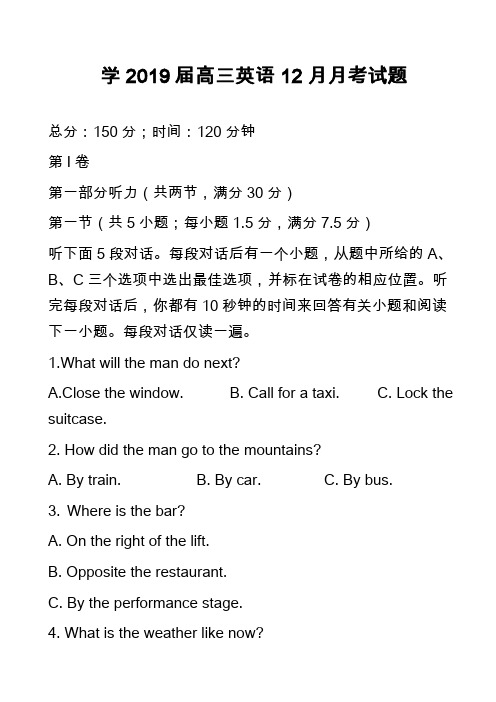
学2019届高三英语12月月考试题总分:150分;时间:120分钟第I卷第一部分听力(共两节,满分30分)第一节(共5小题;每小题1.5分,满分7.5分)听下面5段对话。
每段对话后有一个小题,从题中所给的A、B、C三个选项中选出最佳选项,并标在试卷的相应位置。
听完每段对话后,你都有10秒钟的时间来回答有关小题和阅读下一小题。
每段对话仅读一遍。
1.What will the man do next?A.Close the window.B. Call for a taxi.C. Lock the suitcase.2. How did the man go to the mountains?A. By train.B. By car.C. By bus.3. Where is the bar?A. On the right of the lift.B. Opposite the restaurant.C. By the performance stage.4. What is the weather like now?A. Sunny.B. Windy.C. Snowy.5. What does the man mean?A. He hid the glass.B. He gave the glass to a friend.C. He broke the glass.第二节(共15小题;每小题1.5分,满分22.5分)听下面5段对话或独白。
每段对话或独白后有几个小题,从题中所给的A、B、C三个选项中选出最佳选项,并标在试卷的相应位置。
听每段对话或独白前,你将有时间阅读各个小题,每小题5秒钟;听完后,各小题将给出5秒钟的作答时间。
每段对话或独白读两遍。
听下面一段对话,回答第6、7题。
6. What time is it now?A. 4:25.B. 4:30.C. 4:35.7. What do we know about the speakers?A. They missed their train.B. They got on the wrong train.C. They are lucky to catch the train.听下面一段对话,回答第8、9题。
浙江省建人高复2019届高三12月份月考试卷英语试卷(含答案)
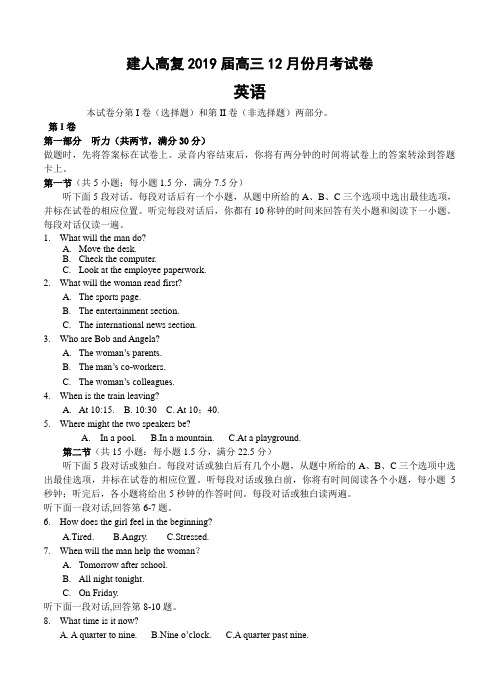
建人高复2019届高三12月份月考试卷英语本试卷分第I卷(选择题)和第II卷(非选择题)两部分。
第I卷第一部分听力(共两节,满分30分)做题时,先将答案标在试卷上。
录音内容结束后,你将有两分钟的时间将试卷上的答案转涂到答题卡上。
第一节(共5小题;每小题1.5分,满分7.5分)听下面5段对话。
每段对话后有一个小题,从题中所给的A、B、C三个选项中选出最佳选项,并标在试卷的相应位置。
听完每段对话后,你都有10称钟的时间来回答有关小题和阅读下一小题。
每段对话仅读一遍。
1.What will the man do?A.Move the desk.B.Check the computer.C.Look at the employee paperwork.2.What will the woman read first?A.The sports page.B.The entertainment section.C.The international news section.3.Who are Bob and Angela?A.The woman’s parents.B.The man’s co-workers.C.The woman’s colleagues.4.When is the train leaving?A.At 10:15.B. 10:30C. At 10;40.5.Where might the two speakers be?A.In a pool.B.In a mountain.C.At a playground.第二节(共15小题:每小题1.5分,满分22.5分)听下面5段对话或独白。
每段对话或独白后有几个小题,从题中所给的A、B、C三个选项中选出最佳选项,并标在试卷的相应位置。
听每段对话或独白前,你将有时间阅读各个小题,每小题5秒钟;听完后,各小题将给出5秒钟的作答时间。
每段对话或独白读两遍。
浙江省杭州市建人高复高三英语上学期第一次月考试题
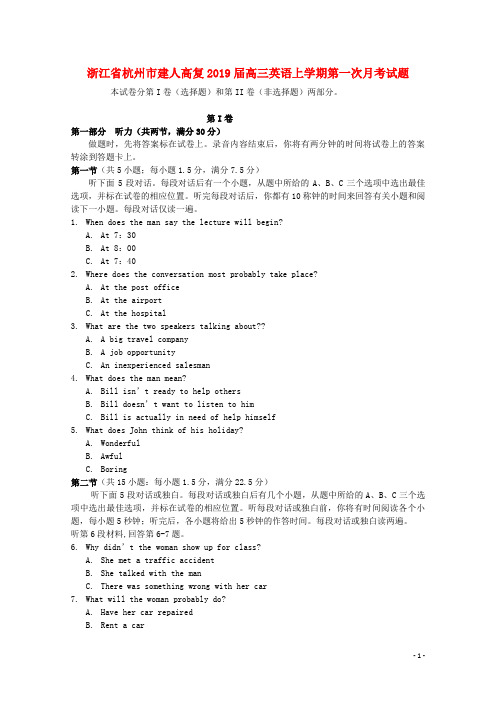
浙江省杭州市建人高复2019届高三英语上学期第一次月考试题本试卷分第I卷(选择题)和第II卷(非选择题)两部分。
第I卷第一部分听力(共两节,满分30分)做题时,先将答案标在试卷上。
录音内容结束后,你将有两分钟的时间将试卷上的答案转涂到答题卡上。
第一节(共5小题;每小题1.5分,满分7.5分)听下面5段对话。
每段对话后有一个小题,从题中所给的A、B、C三个选项中选出最佳选项,并标在试卷的相应位置。
听完每段对话后,你都有10称钟的时间来回答有关小题和阅读下一小题。
每段对话仅读一遍。
1.When does the man say the lecture will begin?A.At 7:30B.At 8:00C.At 7:402.Where does the conversation most probably take place?A.At the post officeB.At the airportC.At the hospital3.What are the two speakers talking about??A. A big travel companyB. A job opportunityC.An inexperienced salesman4.What does the man mean?A.Bill isn’t ready to help othersB.Bill doesn’t want to listen to himC.Bill is actually in need of help himself5.What does John think of his holiday?A.WonderfulB.AwfulC.Boring第二节(共15小题:每小题1.5分,满分22.5分)听下面5段对话或独白。
每段对话或独白后有几个小题,从题中所给的A、B、C三个选项中选出最佳选项,并标在试卷的相应位置。
2019-2020年高三上学期12月月考试题 英语 含答案
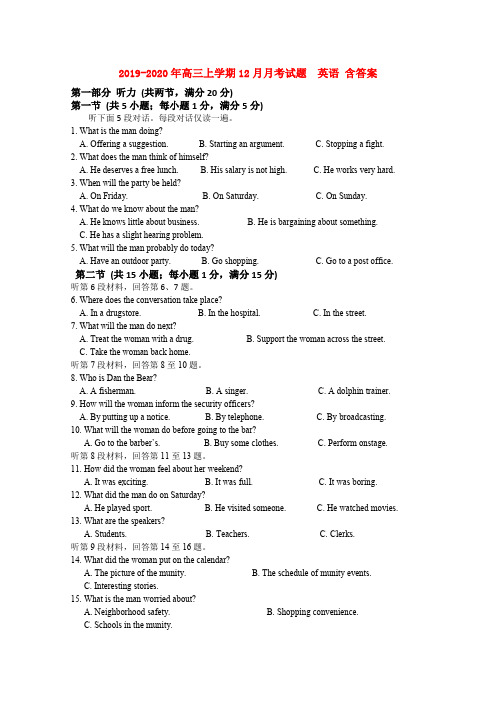
2019-2020年高三上学期12月月考试题英语含答案第一部分听力(共两节,满分20分)第一节(共5小题;每小题1分,满分5分)听下面5段对话。
每段对话仅读一遍。
1. What is the man doing?A. Offering a suggestion.B. Starting an argument.C. Stopping a fight.2. What does the man think of himself?A. He deserves a free lunch.B. His salary is not high.C. He works very hard.3. When will the party be held?A. On Friday.B. On Saturday.C. On Sunday.4. What do we know about the man?A. He knows little about business.B. He is bargaining about something.C. He has a slight hearing problem.5. What will the man probably do today?A. Have an outdoor party.B. Go shopping.C. Go to a post office. 第二节(共15小题;每小题1分,满分15分)听第6段材料,回答第6、7题。
6. Where does the conversation take place?A. In a drugstore.B. In the hospital.C. In the street.7. What will the man do next?A. Treat the woman with a drug.B. Support the woman across the street.C. Take the woman back home.听第7段材料,回答第8至10题。
高中英语真题:学2019届高三英语12月月考试题_4
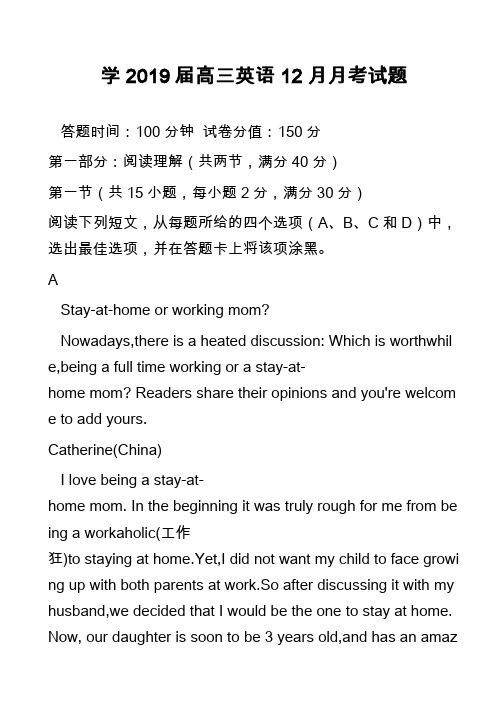
学2019届高三英语12月月考试题答题时间:100分钟试卷分值:150分第一部分:阅读理解(共两节,满分40分)第一节(共15小题,每小题2分,满分30分)阅读下列短文,从每题所给的四个选项(A、B、C和D)中,选出最佳选项,并在答题卡上将该项涂黑。
AStay-at-home or working mom?Nowadays,there is a heated discussion: Which is worthwhil e,being a full time working or a stay-at-home mom? Readers share their opinions and you're welcom e to add yours.Catherine(China)I love being a stay-at-home mom. In the beginning it was truly rough for me from be ing a workaholic(工作狂)to staying at home.Yet,I did not want my child to face growi ng up with both parents at work.So after discussing it with my husband,we decided that I would be the one to stay at home. Now, our daughter is soon to be 3 years old,and has an amazing personality. It's not for everyone but it is very rewarding in the long term.Sassy(Canada)Taking care of children is a temporary job,and children will g row up and leave.The longer women are out of the workplace, the harder it is to enter it.Women need to realize and accept t hat you do not want to be dependent on anyone for basic food ,clothes and shelter. It has been hard to work and take care of my kids but I make it work.Cynthia(US)Some days I think we shouldn't give up on our careers.And some days I'm jealous of the moms who get to stay home or a t least work part time.I'm the only one that supports the family, so there will never be an option for me.I have the career and ti tle I've always wanted but now I can't help but think it's at the expense of precious time with my family.Celina(US)Being a stay-at-home mom isn't always easy,but it is worth it! Being there with my children means they are getting the exact love and care I want them to have.We do not have a lot of money,but we've s acrificed to make it possible.1.What can we learn about Catherine?A.She stayed at home because she was tired about her job.B.Her husband agreed with her staying at home.C.Her daughter was very naughty.D.She accustomed herself to staying at home easily.2.How many working moms in this passage?A.1B.2C.3D.43.Which one is NOT true?A.Celina feels dissatisfied with the life now.B.Cynthia has no other choice but to get a job.C.Sassy is determined to be an independent woman.D.Catherine thinks that being a stay-at-home mom is worthwhile.BAn Indian barber has come up with a novel technique to giv e people haircuts using just a small comb and a burning candl e instead of a pair of scissors.Just like any barber, Dasharath Kumar,28, combs the hair and meticulously runs the flame of t he candle on the ends,giving it a unique finish.The'cutting-edge' technique has made him the most demanded barber in his small village in Gulbarga in Karnataka in southern India.While Dasharath joined his family business when he was 15,t he unique idea only clicked him five years ago.He says: "Elect ricity cut was common in our village and we were used to wor king in dark.But one evening while I was cutting the hair of a c ustomer, power went off and I had to use the light from a cand le to finish the haircut. But the flames of the candle that night i nspired me to think of using a new technique for trimming(修剪)hair.""I had bunch of regular customers so when I told them abou t the experiment,they happily said they trusted me and my skil ls and gave a nod for the new technique.Surprisingly, it came out very well.Since then there was no looking back."Started with only 20 pence,customers now happily pay him £1 for his novel way of haircut.One of his daring customers Y usuf Khan,who waited for nearly two hours for his turn, said:" Every barber gives a haircut using scissors but the fun of getti ng a haircut with a candle flame is unbeatable.Initially,I was n ot prepared for it but once I saw the magic of his hands, I nev er went back to a regular barber.”4.The best title for the passage is probably________.A. An amazing Indian barberB. A latest cutting fashionC. A regular barber's futureD. What made a good barber5.The underlined word"meticulously"probably means________ _.A.casuallyB.carefullyC.freelyD.random ly6.When was Dasharath inspired to trim hair with a burning ca ndle?A.At the age of five.B.After his graduation.C.After a power failure.D.When it's getting dark.7.What can we conclude from the text?A.No customers want to be back to Dasharath's salon.B.Dasharath charges more money than any other barber.C.A traditional barber can't make a living in the future.D.Many people are attracted by Dasharath’s technique.CPublic transport is declining in the rich world.To those who have to squeeze onto the number 25 bus in London,or the A t rain in New York,the change might not be noticeable.But publi c transport is becoming less busy in those places,and passen ger numbers are flat or falling in almost every American city.T hat is despite healthy growth in urban populations and employ ment.Although transport agencies blame their unpopularity on thing s like roadworks and broken signals,it seems more likely that t hey are being outcompeted.App-based taxi services like Uber and Lyft are more comfortable a nd convenient than trains or buses.Cycling is nicer than it was ,and rental bikes are more widely available.Cars are cheap to buy, thanks to cut-rate loans, and ever cheaper to run.Online shopping,home wo rking and office-sharing mean more people can avoid travelling altogether. The competition is only likely to grow.More than one laborator y is developing new transport technologies and applications.S ilicon Valley invented Uber and,more recently, apps that let pe ople rent electric scooters(滑板车)and then abandon them on the pavement.China created sh aring-bicycles and battery-powered"e-bikes",both of which are spreading.Transport agencies should accept the upstarts,and copy them .Cities tend either to ignore app-based services or to try to push them off the streets.That is un derstandable, given the rules-are-for-losers attitude of firms like Uber.But it is an error.It is doubtful that most people make hard distinctions between public and private transport.They just want to get somewh ere,and there is a cost in time,money and comfort. An ideal sy stem would let them move across a city for a single payment,t ransferring from trains to taxis to bicycles as needed.Building a platform to allow that is hard,and requires much sweet-talking of traditional networks as well as technology firms.It is probably the secret to keeping cities moving.8.What is the change in public transport in big cities?A.It is becoming busier.B.It is getting less popular.C.There are fewer traffic delays.D.There is more new transport.9.In the author's opinion,the reason for the decline of public tr ansport is that_______.A.there are roadworks and broken signalsB.people are becoming healthier and employedC.cars and bikes are more and more availableD.transport agencies are seemingly less competitive10.How does the author develop his idea in Paragraph 3?A.By giving examplesB.By providing research resultsC.By stating argumentsD.By comparing different approaches11.According to the text,the key to keeping cities moving is___ _____.A.to develop an ideal system that satisfies everyoneB.to build a platform that appeals to transport agenciesC.to provide people with more means of transportationD.to cater for both traditional networks and technology firms DFor children, eating with their families is not only about preven ting bad outcomes---it is also about developing good ones.Several studies have lo oked at the long-term effects eating with families has on children.Experts say t hat these studies do not seem to prove a cause-and-effect relationship.However,they do suggest a strong tie. About three years ago,the Organization for Economic Co-operation and Development(OECD) looked at data from nearl y three quarters of the worlds countries. Among its findings w as the fact that students who shared a main meal with their fa milies were less likely to skip school.Children who eat a main meal with their families are also lesslikely to be badly-behaved.That is a finding of a study by The National Center o n Addiction and Substance Abuse (CASA) at Columbia Univer sity in New York.In the CASA report,titled “The Importance of Family Dinners VIII",researchers say,"Teens who have freque nt family dinners are more likely to say their parents know a lo t about what's really going on in their lives ..."They also claim t hat when teens say they feel closer to their parents,they are l ess likely to behave badly.Another study from the University of Montreal found that childr en who ate with their families experience long-term physical and mental health benefits.These children were physically in better shape and drank fewer sugary soft drinks. They also seemed to have better social skills.One researcher,Linda Pagani says that there is"a handful of r esearch suggesting a positive link between eating family meal s together frequently and child and adolescent health".Pagani says that mealtimes shared with parents "likely provide youn g children with firsthand social interaction, discussions of soci al affairs and day-to-day concerns”.She adds that they may likely help the children have better communication skills with others.12.What does the underlined word "they"refer to?A.long-term effects B. studies C. experts D. families 13.In which aspect can eating together influence children acc ording to the OECD?A.Academic performance.B. Physical health.C. Mental healthD. Social skills.14.How do children benefit from eating family meals together according to Pagani?A.By having healthy food and drinksB. By forming good e ating habits.C.By becoming more social.D. By understand ing their parents' life.15.What is mainly talked about in the passage?A.Easy tips on eating family meals.B. Benefits of family dinners to children.C.Links between eating together and child health.D. Findings of studies about enjoying family dinners.第二节(共5小题;每小题2分,满分10分)根据短文内容,从短文后的选项中选出能填入空白处的最佳选项。
2019届高三英语12月月考试题(含解析)(新版)新目标版

2019学年上学期高三年级十二月月考英语试卷时间:120分钟总分:150分第一部分:听力(共两小节,满分30分)第一节(共5小题;每小题1.5分,满分7.5分)1. 音频Where does the conversation probably take place?A. In a library.B. In a restaurant.C. On a bus.【答案】B【解析】此题为听力题,解析略。
2. 音频How does the woman feel about her work?A. She is disappointed with it.B. She is excited about it.C. She is satisfied with it. 【答案】A【解析】此题为听力题,解析略。
3. 音频What kind of music does the woman like?A. Jazz.B. Classical.C. Folk.【答案】A【解析】此题为听力题,解析略。
4. 音频Why will the man go to Edinburgh?A. To drive the woman there.B. To have a meeting in Glasgow.C. To meet some important people.【答案】C【解析】此题为听力题,解析略。
5. 音频What will the girl do tonight?A. Prepare for an exam.B. Watch TV.C. Go to a movie.【答案】B【解析】此题为听力题,解析略。
第二节(共1 5小题;每小题1. 5分,满分22. 5分)听下面一段较长对话,回答以下小题。
音频6. What does the man suggest doing?A. Going for a walk.B. Having a cup of tea.C. Mailing a letter.7. What is the woman doing?A. Writing a letter.B. Cooking dinner.C. Exercising.【答案】6. A 7. A【解析】此题为听力题,解析略。
- 1、下载文档前请自行甄别文档内容的完整性,平台不提供额外的编辑、内容补充、找答案等附加服务。
- 2、"仅部分预览"的文档,不可在线预览部分如存在完整性等问题,可反馈申请退款(可完整预览的文档不适用该条件!)。
- 3、如文档侵犯您的权益,请联系客服反馈,我们会尽快为您处理(人工客服工作时间:9:00-18:30)。
建人高复2019届高三12月份月考试卷英语本试卷分第I卷(选择题)和第II卷(非选择题)两部分。
第I卷第一部分听力(共两节,满分30分)做题时,先将答案标在试卷上。
录音内容结束后,你将有两分钟的时间将试卷上的答案转涂到答题卡上。
第一节(共5小题;每小题1.5分,满分7.5分)听下面5段对话。
每段对话后有一个小题,从题中所给的A、B、C三个选项中选出最佳选项,并标在试卷的相应位置。
听完每段对话后,你都有10称钟的时间来回答有关小题和阅读下一小题。
每段对话仅读一遍。
1.What will the man do?A.Move the desk.B.Check the computer.C.Look at the employee paperwork.2.What will the woman read first?A.The sports page.B.The entertainment section.C.The international news section.3.Who are Bob and Angela?A.The woman’s parents.B.The man’s co-workers.C.Th e woman’s colleagues.4.When is the train leaving?A.At 10:15.B. 10:30C. At 10;40.5.Where might the two speakers be?A.In a pool.B.In a mountain.C.At a playground.第二节(共15小题:每小题1.5分,满分22.5分)听下面5段对话或独白。
每段对话或独白后有几个小题,从题中所给的A、B、C三个选项中选出最佳选项,并标在试卷的相应位置。
听每段对话或独白前,你将有时间阅读各个小题,每小题5秒钟;听完后,各小题将给出5秒钟的作答时间。
每段对话或独白读两遍。
听下面一段对话,回答第6-7题。
6.How does the girl feel in the beginning?A.Tired.B.Angry.C.Stressed.7.When will the man help the woman?A.Tomorrow after school.B.All night tonight.C.On Friday.听下面一段对话,回答第8-10题。
8.What time is it now?A. A quarter to nine.B.Nine o’clock.C.A quarter past nine.9. What does Bobby ask the woman to do?A. Read him a story.B. Give him some cookies and milk.C. Let him finish watching a movie.10.What is the woman’s attitude toward Bobby?A.Patient and firm.B.Violent and mean.C.Nervous but professional.听下面一段对话,回答第11-13题。
11.How did the man get the car probably?A.He made it by himself.B.He bought it form a car store.C.He bought it from another person.12.What does the price of the car include ?A.All fees but no taxes.B.Free service for one year.C. A one-month service agreement.13.What will the man probably do next?A.Test out the car by himself.B.Get the car keys for the woman.C.Get the contracts ready to sign.听下面一段对话,回答第14-17题。
14.What does the man suggest first?A.Counting sheep.B.Taking a sleeping pill.C.Talking about what is on her mind.15.Who might Jonathan be?A.The woman’s boss.B.The man’s teacher.C.The woman’s son.16.What does the man probably do for a living?A.He runs a restaurant.B.He runs a big company.C.He runs a factory in South America.17.What can we learn from the conversation?A.The man doesn’t have enough money.B.The man made the woman fall asleep.C.The man hasn’t slept well for a whole week.听下面一段独白,回答第18-20题。
18.What would most people rather lose than their phone, according to the talk?A.Their house.B.Their wallet.C. Their computer.19.What do we know about Google V oice?A.It may cost you a lot of money.B.It finds your phone when it’s lost.C.It connects your phone to your computer.20.What does the speaker suggest the audience buy in the end?A.An extra keyboard.B.An extra phone.C.An extra microphone.第二部分阅读理解(共两节,满分35分)第一节(共10小题;每小题2.5分,满分25分)AAs a young man, Al was a skilled artist, a potter with a wife and two fine sons. One night, his older son developed a severe stomachache. Thinking it was only some common intestinal disorder, neither Al nor his wife took the condition very seriously . But the boy died suddenly that night.Knowing the death could have been avoided if he had only realized the seriousness of the situation, he always felt he was guilty. To make matters worse, his wife left him a short time later, leaving him alone with his six-year-old younger son. The hurt and pain of the two situations were more than Al could stand, and he turned to alcohol for help. In time Al became an alcoholic. As the alcoholism progressed, AL began to lose everything he possessed---his land, house, etc. Finally Al died alone in a small bar. Hearing of Al’s death, I thought, “What a totally wasted life! What a complete failure! ”As time went by , I began to re-value my earlier rough judgement . I knew Al’s now adult son, Ernie. He is one of the kindest, most caring , most loving men I have ever known. I saw the love between Ernie and his children, thinking that kindness and caring had to come from somewhere . I hadn’t heard Ernie talked much about his father. One day, I worked up my courage to ask him what on earth his father had done so that he became such a special person. Ernie said quietly, “As a child until I left home at 18, Al came into my room every night, gave me a kiss and said, “love you, son.””Tears came to my eyes as I realized what I had been a fool to judge Al as a failure. He had not left any material possessions behind. But he had been a kind loving father, and left behind his best love.21. From the author’s point of view, ______________.A. Al’s most precious possessions to his son was his love.B. Al took no responsibility for the death of his younger son..C. Al was a complete failure both as a husband and a father.D. Al’s addiction to alcohol was resulted from the leaving of his wife.22. What did the writer learn from the experience?A. No research, no fact.B. Facts speak louder than words.C. Experience is the best teacher.D. Don’t judge people by their appearances.23. What might be the author’s purpose in writing the text ?A.To show us a considerate father.B.To show us that love can make a difference.C. To show us an awful experience.D. To show us that love can wake a father up.BMany people got to know Zou Shiming on the third season of the popular reality TV show Where Are We Going, Dad? on Hunan Television.Zou, 37, is a patient and loving father. He is also a talented boxer who has earned two Olympic gold medals and three World Amateur Champion titles.However, the boxing superstar is suspected to have lost his sight. Zou was spotted wearing sunglasses and clinging to his wife Ran Yingying while walking around the Shanghai Hongqiao International Airport on Dec 21.Some internet users wrote on Sina Weibo that they saw the once-agile boxer run into a pillar at the airport, causing wide speculation that he has lost his sight.Zou has been treated at the Shanghai Changzheng Hospital and is waiting for more physical examinations, according to the Xinhua News Agency.Ran also posted on Dec 21 on Sina Weibo that “the day couldn’t be worse”for her. Many internet users have expressed sympathy, hoping Zou can recover soon.Many still remember the moment when Zou burst into tears after failing to defend the World Boxing Organization (WBO) world flyweight men’s title on July 28 due to a technical knock-out by his rival. “I believe in fate, but am not resigned to it. I will go on fighting until my last breath,”he wrote on July 31 onSina Weibo.Zou also explained why he wanted his title back. “We Chinese boxers have always been looked down upon and lost to foreigners, but we still have to safeguard the dignity of Chinese people. That is the reason why I’m still here, despite already grabbing the belt and Olympic title,”he told CCTV.24. What do we know about Zou Shiming according to the passage?A. He has lost his sight because of fierce competition..B. He became famous because of Where Are We Going, Dad?.C. He won three Olympic gold medals and two World Amateur Champion titles.D. He once failed to earn the World Boxing Organization world flyweight men’s title .25. What does the underlined phrase “clinging to” in Paragraph 2 refer to?A. Sticking to.B. Staying close to.C. Being unwilling to.D. Holding on tightly to .26. Which of the following can be the best title?A. Top Boxer Is Losing Sight.B. Top Boxer Is Struggling.C. Top Boxer Is Losing Popularity.D. Top Boxer Is Gain Popularity.CFace-book chief operating officer Sheryl Sandberg and Anna Maria Chavez, chief of American Girl Scouts, are leading a campaign to discourage the use of the word “bossy”. Does the term destroy the confidence of young girls?The campaign claims that terms like “bossy”are improperly applied to females,preventing schoolgirls from seeing themselves as future “leaders”. From its first application, the word has been definitely connected more with women than with men. It first appeared in 1882,according to the Oxford English Dictionary, mentioning “a lady manager who was extremely bossy”. As late as 2008, the word appeared in reference to females four times more often than males, claim the Ban Bossy campaigners. “To me, the reference is always in association with women,”says Helen Trim, director of Fresh Minds. “I have three brothers and my family still call me ‘bossy’today. ”Her father is the only other family memberwho could be considered in that way, says Trim,but nobody would ever call him so.Some educators recommend that the word should be reclaimed, rather than banned. “But the thing with ‘bossy’is that there’s an infantile (幼稚的)element to it,”says Sara Mills, professor at Sheffield University. “You think of 'bossy' as being like a little kid who's claiming more than he has the right to claim. ”It's not just “bossy”under fire. “Pushy”is another target. The implication is that women shouldn’t present themselves as powerful and confident, Mills suggests, which some women are willing to listen to and accept. Trim points out that many modern female business role models are able to be bosses without being labeled ‘bossy’. And she rarely, if ever,hears the word used within her company. But she says that the damage may be done much earlier in a woman’s life. “It does come about from those early teenage years. ”she says. “I think it’s impossible to ban a word, but if people are replacing it with words like 'confidence' or ‘assertiveness’,we would all be in a much better place. ”27.More evidence is provided to show "bossy" is more applied to females by _ .A. the Oxford English DictionaryB. the Ban Bossy campaignersC. Helen Trim at Fresh MindsD. some experts in education28. Trim's family still consider her bossy because .A. she is expected to lead in her familyB. she is the boss of her companyC. she is a powerful and confident femaleD. her father considers her that way29.The underlined part “under fire” most probably means .A. definitely replacedB. strongly criticizedC. improperly appliedD. eagerly expected30.How does the author sound when referring to the campaign against "bossy"?A. Objective.B. Angry.C. DoubtfulD. Optimistic.第二节(共5小题;每小题2分,满分10分)根据短文内容,从短文后的选项中选出能填入空白处的最佳选项。
